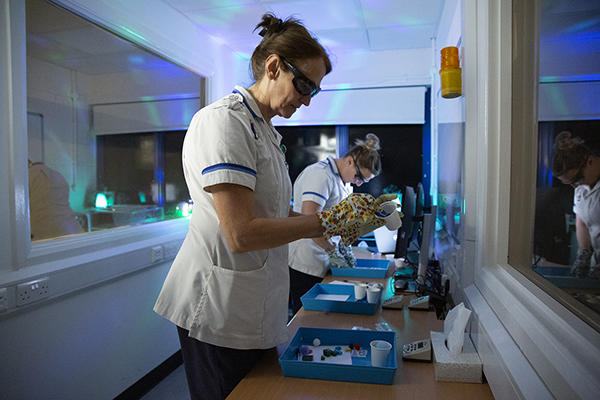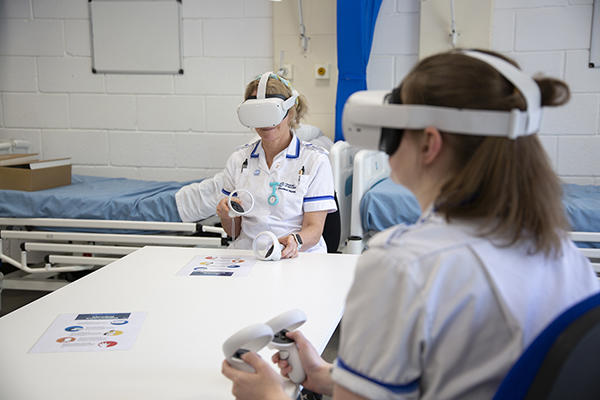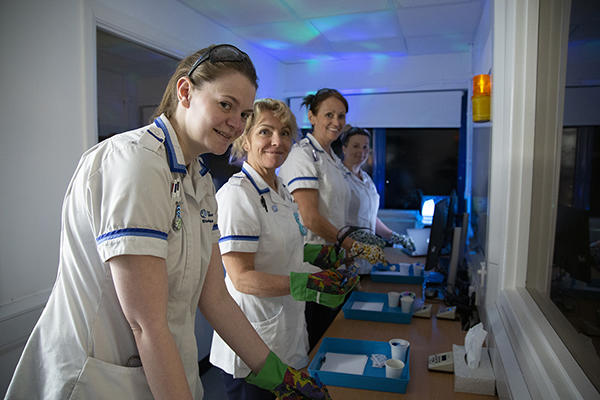New resources designed and being trialled at the University of Worcester aim to give Nursing students a better understanding of the challenges that some of their patients may face.
 Children's Nursing students pilot sensory overload resources
Children's Nursing students pilot sensory overload resources
Nursing lecturers from the University’s Three Counties School of Nursing and Midwifery, have launched a project, using learning resources designed by students within the School of Arts. The project aims to give students an insight into autism and sensory overload that challenges their prior perceptions of such conditions. Second year Nursing students have been piloting these resources.
Wendy Harris, a Children’s Nursing student taking part, said: “The practical tasks were an interesting way to demonstrate how a person with neurodiversity may experience the world. The video resources have given me new insight and understanding and shown how making simple reasonable adjustments could improve their healthcare experience, leading to better outcomes.”
The Experiencing Sensory Overload Simulation project focuses on sensory processing disorders (SPD), which can occur in a number of conditions, including autism, dyspraxia, ADHD (Attention deficit hyperactivity disorder), Asperger’s, global developmental delay, learning disabilities, dementia and head injuries. People who have these conditions process the world and sensory input differently and this can become overwhelming and distracting. While some can be hyposensitive and actively seek sensations, others can be hypersensitive to noise, light, smell, textures and taste.

Lecturers Kirsty Wedgbury and Susan Poultney collaborated with the University’s Creative Media degree students and staff to create bespoke resources. These included two virtual reality simulations from the perspective of a neurodiverse child navigating a world designed for adults, a film of two young people with sensory processing disorder, a parents’ perspective interview and a film considering the representation of autism in the media.
A further practical simulation challenges students to complete daily tasks that require concentration while experiencing intense sensory overload. Students had to contend with loud distracting noises, smell, flashing lights and alterations to balance, fine motor skills and vision, aided with props like unwieldy thick gloves and specialist glasses to alter perception.
Ms Wedgbury said: “We recognised that there was insufficient teaching and learning about Specific Learning Difficulties, in particular sensory processing disorders within the national nursing curriculum. The Experiencing Sensory Overload Project aims to give healthcare professionals the skills to champion inclusive practice and reduce health inequalities.”

Students trialling the resources were encouraged to reflect and consider what reasonable adjustments they might need to make for neurodiverse children and adults accessing healthcare. The simulation experience will be embedded in the University’s year 2 Nursing curriculum from 2024. The lecturers hope this new insight will ensure inclusive practice and the highest standards of patient care. They are also keen to trial this resource with other professional groups, such as in social work, education, paramedic science or medicine, in 2024.
Second year Children’s Nursing student, Jane Ewen, who took part, said: "The simulation experience was fascinating. It gave me amazing insight into how a neuro-diverse child with sensory overload might be feeling. The tasks we were asked to do made me feel slightly stressed, with the difficulties impacting on my senses, together with the noises and lack of light in the room. I will now think carefully on how to make reasonable adjustments for children in the healthcare setting".
Fellow second year Children’s Nursing student, Kasmine Roff, added: “The material really stimulated reflection of previous care delivered and the positive influence this will have on the future care I give.”